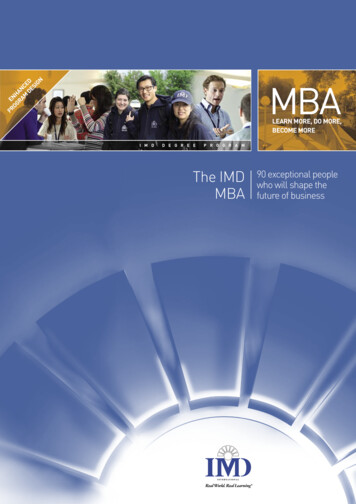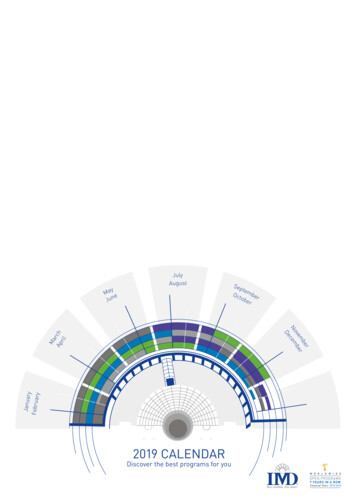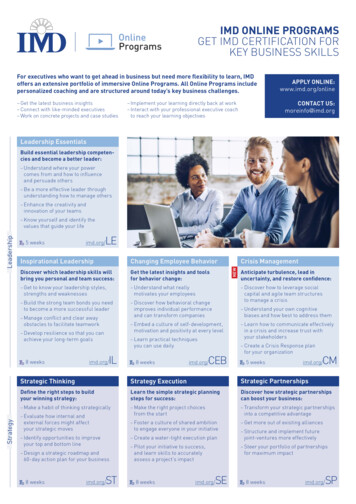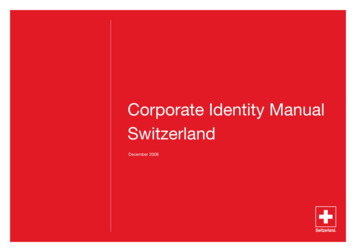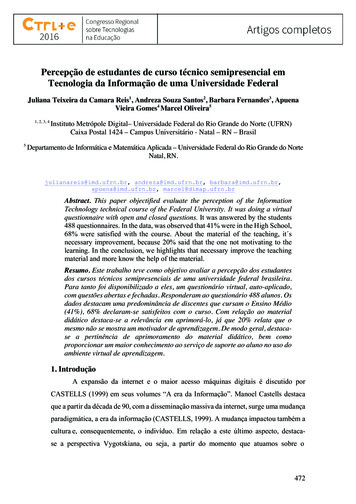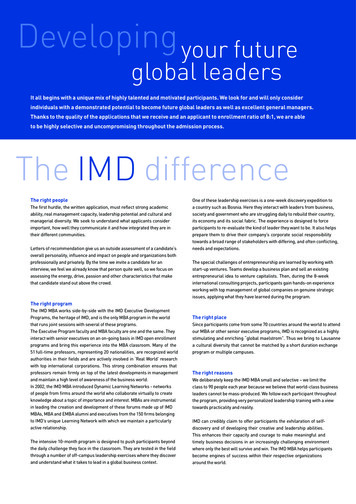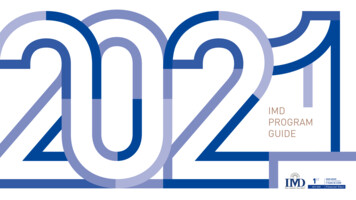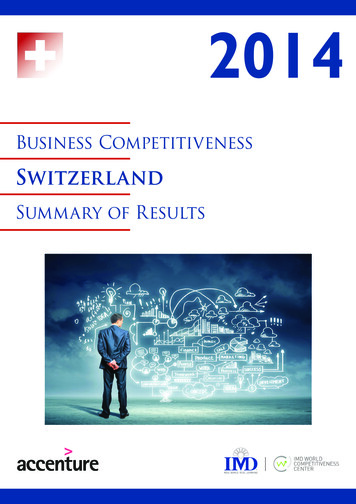
Transcription
2014Business CompetitivenessSwitzerlandSummary of Results
October 2014Business Competitiveness Switzerland 2014: Summary of ResultsCopyright 2014 by IMD:Institute for Management Development, Lausanne, SwitzerlandFor further information, please contact theIMD World Competitiveness Center at:IMD23, Ch. de BelleriveP.O. Box 915CH-1001 LausanneSwitzerlandTel:Fax:e-mail :Internet:eShop: 41 21 618 02 51 41 21 618 02 e IMD World Competitiveness Center Team:At IMDProfessor Arturo BrisDr. José CaballeroLuchia MalletAnne-France Borgeaud PierazziCarin GrydbeckMadeleine HedigerCatherine JobinWilliam MilnerDirector of IMD World Competitiveness CenterResearch FellowPrograms and Client Relationship Associate ManagerSenior Economist & Head of WCC OperationsProjects, Marketing and Press CoordinatorData Research and Online Services SpecialistOrder and Sales AdministratorInformation ResearcherIn collaboration with Accenture AG:Thomas D. MeyerBenjamin TueckSteven FuerthBenjamin BastianDavid CheretCountry Managing Director, Accenture AG SwitzerlandSenior Manager, Accenture AG SwitzerlandManager, Accenture GmbH GermanyConsulting Analyst, Accenture AG SwitzerlandConsulting Analyst, Accenture AG SwitzerlandSpecial thanks to Karine Avagyan (IMD Research Associate), IMD Information Center and IMD IT Support.
Table of ContentsI. Introduction . 2II. Business competitiveness structure . 3III. Key Findings . 51
I. IntroductionThe IMD World Competitiveness Center, a pioneering institution in the study ofcompetitiveness, has developed a groundbreaking conceptual framework and methodologyto study firm competitiveness. The Center partnered with Accenture Switzerland to conducta study about the competitiveness of the largest Swiss firms.The report focuses on the firm-specific practices and processes that successful Swisscompanies employ to strengthen their competitiveness. Our aim was to obtain insights intothe internal behaviors and dynamics of those firms and their effects on the differentdimensions of competitiveness. We did so by gathering relevant data through our BusinessCompetitiveness Survey, which captured the opinions of respondents regarding theirrespective industries, the position of their firms in the business cycle and several intrinsiccorporate dimensions.We used the Handelszeitung Top 500 Swiss companies (2014) and the Capital IQ CompanyScreening Report to identify our sample of companies. We identified the Swiss GrowthChampions (or more competitive firms) according to their profitability from 2009 to 2013.Using the compound annual growth rate (CAGR) of revenues and profit margin indicators, 36Growth Champions were identified, including 26 cross-industry firms, 7 banks and 3insurance companies. Companies were eligible only if data for all five years was available. Inaddition, the Growth Champions included only companies with their main headquarters inSwitzerland. The assessment does not include firms that experienced extraordinary eventssuch as mergers and acquisitions during the 2009 to 2013 period because such eventsinfluenced their results. It also excludes the real estate industry because it showedextremely volatile results, which were heavily influenced by single development projects.The IMD World Competitiveness Center contacted 7,333 possible survey respondents from289 companies. Final results are based on a total of 660 survey responses (9% rate)representing 104 firms, 69 respondents belong to 14 Growth Champions.Figure 1. Summary of methodologyInitial phaseDesign conceptualframeworkDevelop list of criteriaDevelop BusinessCompetitiveness SurveyIdentify GrowthChampionsSurvey phaseBuild online surveyIdentify target companyand survey respondentsLaunch the BusinessCompetitiveness SurveyEngage/follow up withrespondents2Analysis phaseCollect dataMap dataConstructcompetitiveness factorsAnalyze data: Subjectdata to tests
II. Business competitiveness structureBusiness competitiveness is the capacity of a firm to create value through sustainable longterm growth and profitability. There are two dimensions of business competitiveness –general and intrinsic –. The general dimension influences the nature of the practices a firmchooses to adopt. It refers to structural elements that define the context in which a firmoperates (e.g., the regulatory framework of a given country) and its industry-relatedvariables (e.g., whether a particular industry is capital or labor intensive).The intrinsic dimension refers to the behaviors and practices that allow a firm to sustain itsperformance over the long term. It includes governance, organizational, functional,sustainability, talent development and digital factors. The governance factor concerns all thepractices, processes and structures necessary to govern the firm effectively, e.g. theeffective fulfillment of the board of directors’ role. The organizational factor refers to the topmanagement team’s practices and processes that allow for the sound operation of the firm,e.g. the ability of the management team to adapt the firm’s strategy to market changes. Thefunctional factor relates to the firm’s operational processes, e.g. marketing strategies andinnovation.The sustainability, talent development and digital factors concern practices that enablefirms to ensure the effectiveness of its governance and organizational and functional factors,e.g. practices that enable firms to remain dynamic vis-à-vis their competitors (e.g. level ofdigitization) and the ability of firms to build an organizational culture that fosterscollaboration among its members. Figure 2 represents our conceptualization of businesscompetitiveness.Firm performance is an outcome of intrinsic factors in combination with structural andindustry factors. That is to say, intrinsic factors include the capabilities of a particular firm,which in combination with structural and industry factors impact the performance of thecompany. Indeed, the correlation among these factors may be strong, but this is notsurprising because it reflects that firms with high levels of competitiveness function incontexts that facilitate the conduct of businesses and they implement certain practices anddevelop internal processes that have a strong impact on their performance.3
Figure 2. Structure of business dustry factor4
III. Key Findings1. Successful Swiss companies adopt more dynamic governance practices with clearaccountability: Boards guide the actions of senior leaders by exercising their supervision andstrategic roles effectively.Boards continuously interact and collaborate with management through an openinformation policy.Accountability is upheld throughout all levels of the company by implementingconsistent performance measurement and evaluation processes.2. Human capital and employee engagement are crucial for sustaining growth: Growth Champions consider the development of talent as a key factor in sustaininggrowth and profitability.The fostering of employee engagement complements the recruitment, developmentand retention of talent.The focus on talent as a key priority enables companies to enjoy higher productivity,lower turnover of key positions and lower absence rates.3. An innovation-centric culture is key for expanding into new revenue pools: Continuous innovation is among the factors that significantly differentiate topperformers from other companies in the study.The encouragement of an innovative culture is however coupled with a limitedwillingness to make capital-heavy investments in times of uncertainty.Top managers recognize the positive correlation between innovation andcompetitiveness and encourage employees to work on the improvement of productsand services.4. A strong and focused organization with transparent management is essential forsurviving uncertainty: The focus lies in promoting internal strength rather than pursuing unproven marketopportunities.It is particularly important that objectives for top management and the entireworkforce are set in accordance with the company’s strategy.Transparent decision-making is essential for reducing uncertainty and building trust.5. Growth Champions develop market-focused strategies: Successful companies establish long-term client relationships by ensuring ongoingand in-depth interactions with customers.Strong emphasis is assigned to the significance of customer insights for thedevelopment of firm strategy.Acquiring a good understanding of customer needs and businesses is required fordeveloping customized products and services.5
6. Successful Swiss companies transform through flexible and lean processes: Top managers are ready to transform their core business in order to match newmarket requirements.Adjustments to new market forces and requirements are realized without disruptingdaily business.Process excellence and lean management result in streamlined core businessoperations and make room for innovation and future growth.7. A more risk-averse strategy with ethical standards and a compliance culture is essentialfor retaining profits and limiting expenditures: A high level of trust relates to a lower need to allocate budgets to risk controlmeasures.The commitment of employees to the company’s targets and guidelines ensurescompliance and consistency with legal requirements.Appropriate levels of net loans and a stable financial basis enable companies to reactto sudden market changes in an uncertain environment.We also find that Growth Champions create value at the shareholder and employmentlevels. At the shareholder level, Growth Champions achieved abnormal stock marketperformance (7.6% per year) during the 2010–2013 period. At the employment level, GrowthChampions generated about 18% more jobs than other companies in the study did over thesame period.6
IMD World Competitiveness CenterChemin de Bellerive 23P.O. Box 915CH-1001 LausanneSwitzerland 41 21 618 02 51wccinfo@imd.orgIMD, IMD INTERNATIONAL REAL WORLD. REAL LEARNING, IMD BUSINESS SCHOOL and IMD WORLD COMPETITIVENESS YEARBOOK are trademarks of IMD- International Institute for Management Development
The IMD World Competitiveness Center, a pioneering institution in the study of competitiveness, has developed a groundbreaking conceptual framework and methodology to study firm competitiveness. The Center partnered with Accenture Switzerland to conduct . Switzerland 41 21 618 02 51 wccinfo@imd.org IMD, IMD INTERNATIONAL REAL WORLD. REAL .
